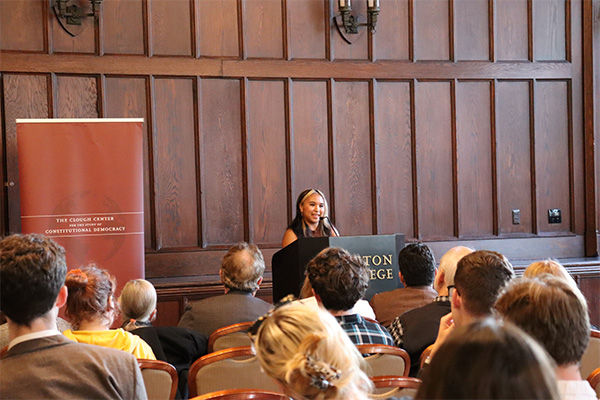Changing of the Seasons: Rigney’s Ecopoetry on Simplifying the Chaos
By Jesse Julian | September 2025
Jessica Rigney tackles our bodily experience with change in “The Skin’s Instruction.” She places us at the cusp of a seasonal shift and reconnects us with the environment, reminding us to listen to the simplicity of sensory experience.
The beginning of the academic year aligns with a drastic seasonal change that we know all too well. The last summer days simmer away into the browning of autumn leaves, and the humid air transitions to a crisp breeze. In Jessica Rigney’s “The Skin’s Instruction,” a third-person narrator insists that it’s important that summer, a personified force, flattens itself against autumn; there’s significance in the immediate back-to-back transition between difficult heat and sudden cold. As I enter my senior year at BC, this is what I’ve grappled with over and over again—the harsh change in the environment reflects the fall semester’splunge into academia and added responsibility.
This change in life resists straightforward understanding, mirrored by the poem’s form. Fully taking advantage of free verse’s lack of rules, the poem breaks and capitalizes at unexpected parts. Each line collides with the next, deceptively organized into “couplets.” Its grammar is unclear and messy. Incomplete sentences litter the stanzas, only providing vague ideas and concepts of what is intended. The narrator leaves the reader responsible for finishing the thought. In conjunction with structure, familiar images related to the environment offer us themes of instability and uncertainty.
But the titular line takes center stage of the poem: “recall / How simple the skin’s instruction.” The beauty of environmental poetry is it reminds us that it doesn’t take a scientist to understand and connect with nature and the environment. Taking the time to listen to what your skin senses from the weather creates an informative space for reflection. The average person can listen to the simple instructions of one’s body.
She ends with a final note about change: “There isn’t time for fuss just enter / The day she says just enter the poem just.” Despite the confusion of change, present within both the poem and our lives, we cannot waste time fussing about how or when to do so—we must enter and start the day. Hopefully, Rigney and other writers of ecopoetry can motivate us to initiate and embrace the change that Schiller so enthusiastically inspires, especially as we begin this school year with a fresh start!



